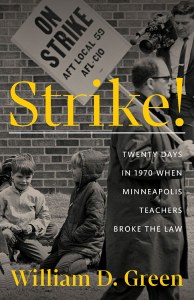Southside Pride: Even if coordinated strikes don't happen, this is historic
 Speaking of the last time MFT members struck, there is quite a tale hanging thereby. And who is better suited to write that tale than a person who has sat on the Minneapolis school board, stepped in to rescue the school system as superintendent for four years when it had a leadership crisis, and was a professor of history at Augsburg University both before and after his stint as MPS superintendent? That very person, Dr. William (Bill) Green, has done just that. [Strike: Twenty Days in 1970 When Minneapolis Teachers Broke the Law]
Speaking of the last time MFT members struck, there is quite a tale hanging thereby. And who is better suited to write that tale than a person who has sat on the Minneapolis school board, stepped in to rescue the school system as superintendent for four years when it had a leadership crisis, and was a professor of history at Augsburg University both before and after his stint as MPS superintendent? That very person, Dr. William (Bill) Green, has done just that. [Strike: Twenty Days in 1970 When Minneapolis Teachers Broke the Law]
Asked if the strikers got their demands in the end, Dr. Green revealed the third reason he had to write this book: “They did, and here’s the thing that makes that strike historic, in my opinion: They changed the law of the state. … And in a sense, that was much more important than the other issues they were bargaining for. The law that was changed basically placed the state on the side of labor in a way that it hadn’t been in the past, whereas before, the state was anti-labor because it kept labor from staking a position and being viewed as equals, as people. There was an incremental improvement over the quality of life – and that’s one of the reasons you haven’t seen strikes. … When these people, who had invested decades of their lives to an institution and had accrued reasonable retirement funds, benefits, and things of that nature – when they threw it all out to pick up a placard and go to the streets to fight for something like the change of a law, that, to me, means you’re talking about a lot of heroes here. Ordinary people acted heroically. That’s what the story, for me, is about.”
Full article at Southside Pride.



